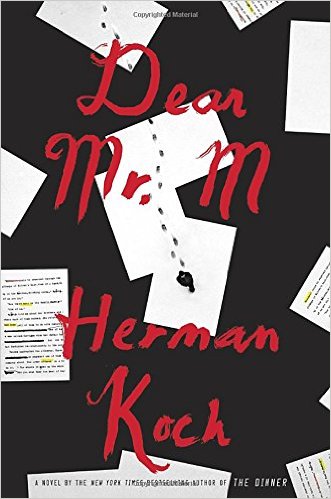I have been a huge fan of Herman Koch ever since I read his deliciously wicked The Dinner (2012), around three years back. I was blown away by the sophisticated, scalpel-like prose and his ability to put even the most quotidian setting under the microscope. His no-holds-barred, acerbic observations that cut to the quick and his faculty to brazenly state the things most people would rather shirk from bringing attention to, for fear of being judged, is extremely refreshing.
 Dear Mr M, his latest work, is a metafictional story featuring an unnamed narrator who seems to be stalking a prolific writer, Mr. M, for reasons that are gradually unveiled as the story progresses. Soon, we are told that Mr. M has written a bestselling book about the mysterious encounter of two teenagers with their teacher after which the teacher went missing indefinitely. We later realise that our stalker might be more involved in that episode than he is letting on. If you are going into this book expecting a brisk crime thriller, then you will inevitably be disappointed. Koch is not interested in plotting a perfect whodunit or tying up all the loose ends of his story, but rather in picking at threads within the framework of his plot-line.
Dear Mr M, his latest work, is a metafictional story featuring an unnamed narrator who seems to be stalking a prolific writer, Mr. M, for reasons that are gradually unveiled as the story progresses. Soon, we are told that Mr. M has written a bestselling book about the mysterious encounter of two teenagers with their teacher after which the teacher went missing indefinitely. We later realise that our stalker might be more involved in that episode than he is letting on. If you are going into this book expecting a brisk crime thriller, then you will inevitably be disappointed. Koch is not interested in plotting a perfect whodunit or tying up all the loose ends of his story, but rather in picking at threads within the framework of his plot-line.
In Dear Mr. M, Koch retains his predilection for bringing a radical perspective to the most ordinary interactions and episodes of the cliche which is our day to day life. In this book, Koch has gone all guns blazing after two classes of people who occupy the upper echelons of society in terms of the self-righteous veneration they command – writers and teachers. These two breeds are so unanimously revered that at times people end up putting them on a pedestal and relinquishing them from all personal accountability. Criticism of any sort, on these two coveted ranks is taken as a sign of nescience on the part of the critic. It’s as if their erudite vocation grants them a free pass to avoid being judged like normal people.
When it comes to teachers, the writer strips away their veneer of respectability and integrity – which, according to him, is a guise behind which they hide their insecurities borne of their dormant profession and middling skills. He lays bare all the niggling thoughts we have all had in our minds about teachers but which our introjected sense of deference makes us push into the recesses of our mind. He considers teachers to be an extremely mediocre, intellectually stagnant class of people who compensate for their lack of flair by bullying intelligent students who are labelled as ‘smart-ass’ or oversmart.
The overriding concept of this novel is to offer a glimpse into the vantage point of a writer. Koch slips into the skin of Mr. M, who is one of those writers who is considered to be the chronicler of a generation, by letting us peek into their his turmoil. Koch relentlessly takes self-deprecating jabs at writers and the literary facade they hide behind, exposing their inward looking, authentic self.
He unabashedly exposes writers – how they keep up a charade of nonchalance and dignified indifference even when they are anxious inside on dwindling sales of their books and how they claim to write their mind all the while trying to bury their true point of views under reams of literary jargon and tropes, fashioning it to make it palatable to general public. Dear Mr. M homes in on the two-way-relationship between a writer and a reader and of how much of a pressure readers’ exert on the writer even though writers apparently seem to have the upper-hand. Many a times the latter have to pander to their readers and recalibrate their opinions based on the feedback they get. There’s a fine line between being opinionated and being infamously vociferous and no one knows that better than a writer. In the book, Mr. M has to bite back his unorthodox views on war and revolution, fearing backlash from his followers. Koch, at times fittingly uses this meta narrative to interject his own aberrant political thoughts through his narrator.
Not content with disparaging only writers, Koch goes a step further and minces no words talking about the publishing world. He is not afraid of taking potshots at the underhandedness publicists indulge in to steal writers by relentless hobnobbing at publishing parties or at the gruelling monotony of literary events.
Sometimes the photographs are intended for special sections of the publication in question. The writer in front of his shelves of CDs. Standing beside his car. With his pet. At the open door of his refrigerator. The shopping list of writer M. A few weeks after the photographer goes away, he finds himself staring at a photograph of himself in an apron – holding a casserole dish and a whisk uncomfortably at waist height – and wondering how he ever could have let things come so far. Agreeing to meet anywhere but at home, therefore, is the safest bet, even if it means posing endlessly beneath a railroad bridge covered in graffiti, after which the photographer again shakes his head and announces with a hangdog look that he wants to try something else, this time at a building site down by the canal.
He comes up with some surprising observations and opinions that initially throw one off by their sheer absurdity, until he expounds on them, making them seem more plausible. For instance, at a book reading he berates one of his fans for not buying his book, making do instead with borrowing a library copy – a concept he abhors. He compares a library book to “a public restroom where you never know who sat on the seat before you got there”.
Koch makes barbed remarks about upper-class writers. For example, one of Mr. M’s colleagues, a prolific writer, has a new book out titled The Garden of Psalms. When Mr M is asked his opinion on it, he scathingly remarks that “Why not call things by their name?…It’s as though the title was already there before N used it.” He also has much to say about the preoccupation of big writers to keep on gaining traction by writing on the war and holocaust, (something that Mr. M is also guilty of), repeatedly in the book. There are some interesting passages which expound on how writers have to reconstruct reality at times because readers expect novels to have a “compact reality”.
Koch deftly deals with candid issues faced by both readers and writers. He talks about the conflict readers generally face while choosing between reading literary fiction or ‘good fiction’ and bad literature. He makes a case for the latter when he says sometimes you feel like gnashing at a greasy hamburger with a soft, soggy bun rather than “nibbling at sophisticated tidbits” at a Michelin starred restaurant. He illuminates on the very relatable sense of guilt we readers sometime feel when we are reading literature that is entertaining but not high brown. He calls his earlier years “paradise of carefree reading” when, oblivious to the distinction, he would mindlessly lose himself in a detective novel.
Most characters in the book are abrasive, self-righteous individuals, but Koch manages to convey sensitive portrayals of their weaknesses. Mr M.’s mother used to be very close to him and the lingering loss he feels, decades after her death, is poignantly depicted. However, the grief is always felt in-character, conveyed behind the garb of matter-of-factness and cynicism. Similarly, death of the mother of one of the characters is viscerally explored. Koch’s visceral insights expands to other aspects of our hidden self too – our relationships with our friends and parents, which makes for an engrossing read.
The caustic tone of the narrator seeps into the narration and in fact, act as a propulsive force for the plot. The only stultifying point is the diatribe about mediocrity which the narrator goes on about repeatedly. Another minor niggle is that the whole class trip was a bit long and winding and deviated from the main plot line. His tirade against teachers is initially stimulating to read but soon he seems to be putting too fine a point on it. Some readers might be averse to Koch’s predisposition to switching between meandering interior monologues of different narrators. Ultimately, despite minor shortcomings, this book is one to revel in, and it should be definitely read by literary buffs for its distinctive style, sardonic insights and unconventional take on writers and the process of writing.











